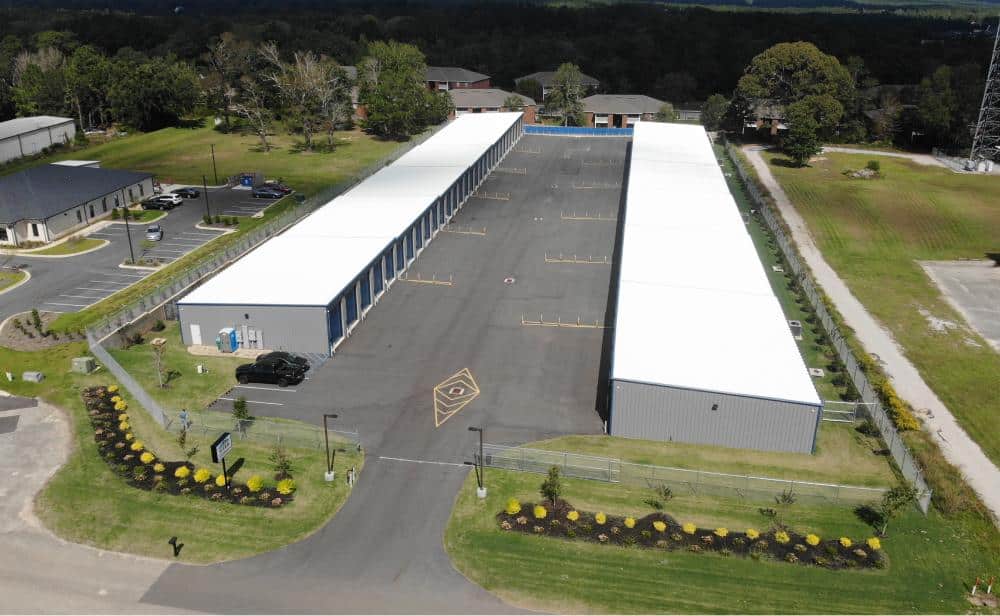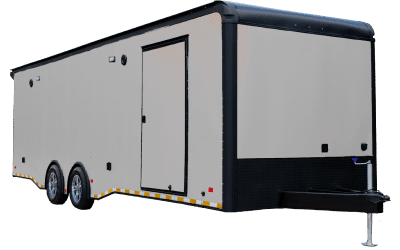Benefits of BUSINESS Storage
for South Alabama bUSINESS oWNERS
Storing business materials offsite can be a game-changer for companies looking to optimize their workspace and improve organization. At Titan Storage, we offer secure, accessible storage solutions that free up valuable office or warehouse space, helping you keep your main business location organized and efficient. Whether you need space for archived documents, excess inventory, equipment, or seasonal supplies, our business storage options provide the flexibility and security to meet your unique needs.
Protection
Our indoor, climate-controlled units keep sensitive materials like records and tools safe from temperature fluctuations and humidity.
Enhanced Security
Titan Storage’s facility features gated access, 24/7 surveillance, and climate-controlled units for added protection and peace of mind.
Convenience
Our flexible access hours let you retrieve or store inventory, documents, and other items when it’s convenient for your business.

Storage Solutions for a Variety of Business Needs
Titan Storage accommodates a wide range of business storage needs, offering secure and convenient solutions to help you optimize your workspace and keep essential items protected offsite. Whether you’re a small business managing excess inventory, a larger company storing seasonal equipment, or a professional needing space for sensitive documents, our facility has the flexibility and features to meet your requirements. Our units are designed to handle diverse business storage demands, from bulky office furniture to specialized equipment, allowing you to streamline operations and keep your primary workspace clutter-free. Commonly stored items include:
- Archive Records: Secure storage for sensitive documents, files, and records.
- Overstock and Inventory: Ideal for businesses with fluctuating inventory or seasonal stock.
- Equipment and Supplies: Store large equipment, tools, and general office supplies.
- Furniture and Office Fixtures: Perfect for office furniture, extra desks, chairs, and fixtures.
- Staging Materials: Store displays, signs, and other materials for events and promotions.
Storage Plans That Fit Your Business’s Needs
Titan Storage offers flexible rental terms to fit the needs of any business. From month-to-month options to long-term rentals, our storage plans are designed to work for your business, whether you need a short-term solution for extra inventory or a long-term storage setup for archived records.
Secure and Flexible Storage for Businesses
Warehouse-Style Units
for Easy Organization
Our spacious units are designed to store business inventory and equipment efficiently, with warehouse-style layouts that allow for organized shelving, bins, and boxes. This setup ensures that you can maximize your storage space, keeping everything accessible and neatly arranged. Whether you need space for excess inventory, seasonal items, or event materials, our units make it easy to categorize, organize, and retrieve items whenever needed.


24/7 Security and Monitoring
At Titan Storage, we prioritize the security of your business assets, providing around-the-clock surveillance for complete peace of mind. Our facility features advanced 24/7 monitoring, including cameras within select storage units. Business owners can remotely access these in-unit cameras at any time, allowing you to check on inventory, equipment, or sensitive records without needing to visit the facility in person. This added layer of security helps you stay connected to your stored items, offering assurance that your assets are safe and secure, day or night.
Climate-Controlled Spaces
for Sensitive Items
Our climate-controlled units are ideal for businesses needing to store items that are sensitive to temperature and humidity changes. These units offer controlled conditions that help protect valuable documents, electronics, artwork, and other materials that may degrade or suffer damage from fluctuations in the environment. Titan Storage ensures that your sensitive business assets remain in pristine condition, ready for use whenever you need them.

What Kind of Storage Space Do You Need?
The type of storage space your business needs depends on the nature of the items you plan to store. Titan Storage offers flexible options designed to accommodate everything from excess inventory and seasonal stock to archive records and office furniture. Our spacious, warehouse-style units are ideal for organizing larger items or bulk supplies, while climate-controlled units provide added protection for sensitive documents, electronics, and delicate materials. With secure, accessible storage tailored to fit your business’s needs, Titan Storage makes it easy to manage and safeguard your assets, whether you’re storing for short-term use or long-term peace of mind.
Explore Our Full Range of Storage Solutions
BUSINESS Storage FAQs
What types of business items can I store?
Our facility is ideal for storing archive records, excess inventory, equipment, and office furniture. Contact us to discuss your specific storage needs.
Are climate-controlled units available for business storage?
Yes, we offer climate-controlled units to protect sensitive items from temperature and humidity changes.
What security measures are in place for business storage?
Titan Storage provides gated access, 24/7 surveillance, and secure locks to ensure all stored items remain safe.
Can I access my storage unit anytime?
We offer 24/7 access hours for our tenants, so you can retrieve items when it’s convenient for you.
Are there discounts for long-term business storage?
We offer both short- and long-term options, with potential discounts for extended rentals. Contact us to learn more.
Can I store promotional materials and staging items?
Yes, our units are ideal for storing promotional displays, signs, and other materials used for events or staging.
How do I choose the right size unit for my business needs?
Our team can help you select the best unit based on the items you need to store. Contact us to discuss your storage requirements.
Titan Storage’s warehouse Style Storage Units Serve business Owners Across South Alabama
Titan Storage
Spanish Fort, AL



